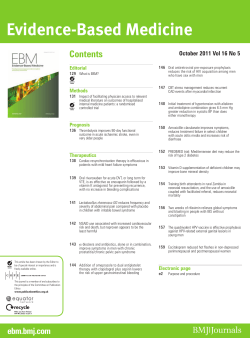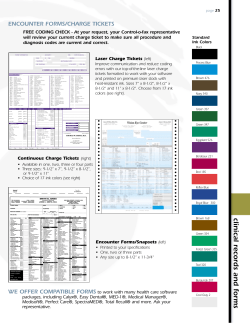
Document 24450
Nonspecific Infections of the Genitourinary Tract Uriner Sistemin Özgün olmıyan Enfeksiyonları Doç.Dr. Hamdi Özkara Nonspecific Infections of the Genitourinary Tract The “Nonspecific Infections of the Genitourinary Tract” are infections with Similar manifestation that are caused by different bacteria (mainly aerobic gram-negative rods. Routes of infection in the genitourinary tract: Ascending Infection ( urethra to bladder) Descending Infection (Kidney to bladder)-hematogenous Direct extension ( bowel to bladder) Lymphatogenous Spread (rectal & colonic lymphatıcs) Nonspecific Infections of the Genitourinary Tract Important Observations Concerning UTI UTI are most common bacterial infection of humans of all ages. Prevalence of urinary tract infection according to age and sex. Age Group neonatal Preschool Scholl Adult Elderly Prevalence %1 %3 %2 %2.5 %30 Sex Ratio (m)1,5:1 (fem) 1:10 1:30 1:50 1:10 Nonspecific Infections of the Genitourinary Tract Susceptibility factors/mechanisms in UTI: Bacterial Virulence Host Defense mechanism Urethral factors Nonspecific Infections of the Genitourinary Tract Acute Pyelonepfritis: An infectious inflammatory disease that involves both the parenchyma and the pelvis of the kidney. Aerobic gram-negative bacteria are the principal causative agents (e-coli are the predominant causative agent) Acute Pyelonephritis Pathology: Gross: The kidney is usually enlarged due to edema. On cut section the abscess appear mainly in the cortex as small rounded areas with a wedge- shaped configuration in focal distribution. Microscopic: In the cortex the parenchyma shows extensive tissue destruction. PML, lymphocytes, plasma cells eosinophils is common. Renal pelvis and calceal system shows also inflammation. Acute Pyelonephritis Acute Pyelonephritis Pathogenesis: Hematogenous spread is the main way for bacterial (e-coli) inflammation. Acute Pyelonephritis Clinical Finding: Symptoms: CVA pain, shaking chills, fever, malaise, cystitis, nausea- vomiting, Signs: ill general apperance, fever (40 C), abdominal discomfort, tenderness, muscle pain… Laboratory Findings: Leucocytosis, pyuria, hematuria, urinary culture (+) Radiologic Findings: Edema of the kidney, enlarged kidney Acute Pyelonephritis Differential Diagnosis: Pancreatitis Basal Pneumonia Acute intra-abdominal Disease PID (women) Acute Pyelonephritis Treatment: Hospitalization Antibiotic therapy (aminoglycosides; ampiciline) Medication for fever, pain, vomiting Hydration Nonspecific Infections of the Genitourinary Tract Chronic Pyelonephritis: Acute uncomplicated UTI do not commonly lead to renal scarring and progressive renal disease. It is mainly a radiological definition. Chronic Pyelonephritis Chronic Pyelonephritis Pathology: The kidney shows atrophy of variable degree depending on the severity and uniformity of the involvement. Histological examination shows diffuse infiltration of the parenchyma with plasma cells and lymphocytes. Chronic Pyelonephritis Clinical Findings: Symptoms: When bilateral and advanced, anemia; azotemia and hypertension Signs:Usually associated with hypertension Laboratory Findings: Azotemia, proteinuria, BUN and creatinine elevation Radiological Findings: Kidney small and irregular, urolithiasis may be evident (shows typical renal scarring on IVP) Chronic Pyelonephritis Treatment: Prevention: In childhood VUR Prevention of UTI Surgical Measures: nephrectomy General Measures: HT, azotemia Nonspecific Infections of the Genitourinary Tract Renal Abscess: Renal Cortical Abscess (Renal Carbuncule): Mainly caused by Staph. Aureus spread by descending way. Predisposing conditions are DM and hemodialysis. Renal Corticomedullary Abscess: most often caused by e-coli due an underlying urinary tract abnormality (VUR, obstruction…) Renal Abscess Renal Abscess Clinical Finding: Symptoms and Signs: Abrupt onset of fever and chill, CVA tenderness and edema, flank mass and loin bulge Laboratory Finding: leukocytosis, Imaging Studies: renal US can confirm abscess, diagnosis is made by CT Renal Abscess Treatment: Antimicrobial Agents: Surgical drainage Nonspecific Infections of the Genitourinary Tract Perinephric Abscess: it develops mainly from rupture of intrarenal abscess into the perinephric space. Gerota’s fascia usually confines the abscess formation to the perinephritic space, it can extend widely throughout the retroperitoneum to affect surrounding structures. Perinephric Abscess Clinical Findings: Symptoms and Signs: spasm of the psoas muscle, peritoneal irritation, scoliosis Laboratory Findings: mild/moderate Leucocytosis, elevated ESR, pyuria… Radiological Findings: Renal US/ CT Perinephric Abscess Perinephric Abscess Treatment: Antimicrobial Agents Surgical drainage Nonspecific Infections of the Genitourinary Tract Acute Cystitis: is an infection of the urinary bladder caused mainly by coliform bacteria (E-coli). The infection usally ascend to the bladder from the urethra. Acute cystitis is much common in girls and women than in boys or men. Acute Cystitis Pathology: The bladder mucosa typically shows hypermia, edema and infiltration by neutrophils. Symptoms: frequency, urgency,nocturia dysuria, low back pain, suprapubic disconfort, hematuria. Significant fever is unusual. Acute Cystitis Signs: No specific physical sign is characteristic. Laboratory findings: Urinalysis typically shows pyuria and bacteriuria. The infecting pathogen is found on urine culture. Acute Cystitis Complication: is the possibility that infection can ascend to the kidney which is prone especially in children with VUR and pregnant women. Prognosis: usually resolve rapidly in response to the therapy. Acute Cystitis Treatment: Antibiotherapy Urinary analgesics ( phenazopyridine HCl) Nonspecific Infections of the Genitourinary Tract Acute Bacterial Prostatitis: mainly caused by aerobic gram-negative rods. Pathogenesis & Pathology: Ascent from urethra Reflux of infected urine into the pr. duct Direct extention from rectum Hematogenous spread Acute Bacterial Prostatitis Clinical Findings: Acute b. Prostatitis is an acute febrile illness characterized by chills, low back and perineal pain, urinary urgency and frequency, dysuria and urinary outlet obstruction. Both myalgia and arthralgia are common. Acute Bacterial Prostatitis Signs: Moderate or high grade fever, rectal palpation typically discloses an exquisitely tender, swollen prostate gland and warm to the touch. Laboratory findings: leukocytosis with shift to the left, urinalysis shows pyuria, hematuria Acute Bacterial Prostatitis Complication: may lead to acute urinary retantion; bacteremia may lead to septiz shock. Prevention: Urethral instrumentation should never be done if urine is known to be infected. Acute Bacterial Prostatitis Treatment: Bed rest/ hospitalization Antibio therapy ( fluoroquinolone, cephalosporine, penicile, aminoglyceride..) Antipiretics / analgesics Parenteral nutrition Nonspecific Infections of the Genitourinary Tract Other Infections: Acute Epididymitis Acute Orchitis Prostatic abcsess Acute urethral syndrome in women Papillary necrosis of kidney Xanthogranulomatous pyelonephritis
© Copyright 2025





















